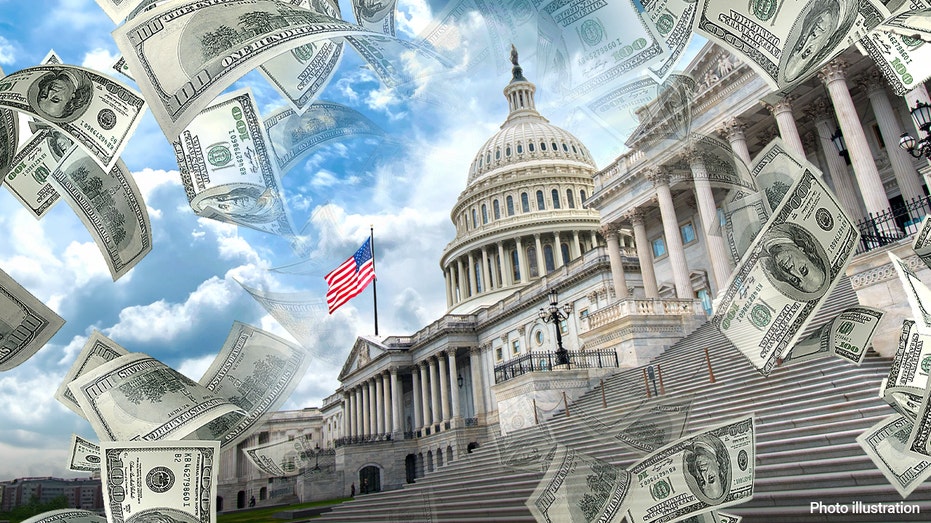Trump's tax cut plans face bond market headwinds, GOP lawmakers warn
Federal budget deficits have widened amid higher interest rates on the $36 trillion national debt
Expert reveals the ‘key’ for the bond market that has investors ‘worried’
SlateStone Wealth chief market strategist Kenny Polcari weighs in on rising bond yields as they continue to put pressure on the stock market.
President-elect Trump is planning to pursue an ambitious tax cut agenda that extends key parts of his 2017 tax reforms once he returns to the White House next week, but some Republican lawmakers are warning that rising bond yields could hinder those plans.
House Republicans held a closed-door meeting on Capitol Hill, where some GOP lawmakers raised concerns that the cost of extending the 2017 tax cuts, which has been estimated at $4 trillion over a decade, could strain the government's ability to service its $36 trillion debt — which is already growing at a rate of $2 trillion a year.
"The buyers of our bonds are getting nervous that we're at the point that we cannot pay it back. That affects every one of us," Rep. Ralph Norman, R-S.C., told reporters. "If we can't sell bonds, guess what? We're in a ditch."
The bond market is focusing on the incoming administration's agenda as well as the Federal Reserve's rate-cutting plans, which appear likely to slow amid stubborn inflation. Signs that the budget deficit could widen may contribute to bond yields rising, as they did earlier this week.
SEN. CRUZ REINTRODUCES BILL TO EXEMPT TIPS FROM FEDERAL INCOME TAXES

The federal budget deficit has widened to roughly $2 trillion a year amid rising interest costs. (FOX Business/Photo Illustration / Fox News)
Longer-dated U.S. Treasury yields rose to their highest levels since November 2023, with the 10-year bond yield hitting a high of 4.79% before it declined to 4.66% on Wednesday afternoon after the release of the Labor Department's latest inflation reading.
U.S. bond yields rose in response to the Fed's rate hikes in recent years to tame inflation. While that led to progress in bringing inflation closer to the Fed's 2% target, it also increased the cost of servicing the national debt, which exceeded federal spending on defense and Medicare last year — making it the second-largest line item in the federal budget behind only Social Security.
"Congress has to reduce the deficit," said Rep. Andy Barr, R-Ky., in a Reuters report. "The bond market is telling Congress that if we don't get our fiscal house in order, everybody's mortgage rates, everybody's credit card rates, everybody's auto loan rates, are going to continue to go up."
US NATIONAL DEBT HITS A NEW RECORD: $36 TRILLION
With Republicans in control of the White House and both the House and Senate, albeit with slim majorities, GOP lawmakers will have an opportunity to pass a tax and spending bill through the budget reconciliation process — which bypasses the legislative filibuster's 60-vote threshold in the Senate.
The reconciliation process was how GOP lawmakers enacted Trump's first round of tax cuts in 2017, but to comply with reconciliation rules about long-term deficit impacts, its individual tax cuts were set to sunset at the end of this year. Trump plans to extend those provisions, but details will depend on what lawmakers in Congress can negotiate.
Democrats have criticized those plans as mainly benefiting wealthy Americans and corporations while eroding the country's fiscal position. Sen. Chris Murphy, D-Conn., said Trump and Republicans are "going to try to distract the press and the public and the information ecosystem away from the thievery that is going to happen with this massive tax cut."
Barr said any reconciliation package used to advance tax reform should include both economic stimulus and enough credible spending cuts that markets will be persuaded Congress is addressing America's fiscal challenges.
GET FOX BUSINESS ON THE GO BY CLICKING HERE
"Will this reconciliation actually reduce the deficit? If they think that it will, that has the very real potential of lowering Treasury yields," Barr said. "What we need to say to the American people is, look, this is not austerity. This is not painful cuts. This is about lowering your mortgage payment."
Reuters contributed to this report.




















